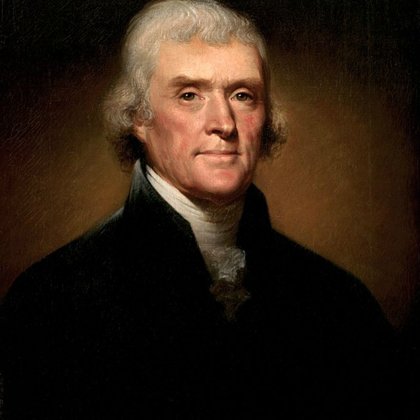THOMAS JEFFERSON (1743-1826) WAS THE THIRD PRESIDENT OF UNITED STATES,FROM (1801 - 1809).THOMAS JEFFERSON HAS PLAYED A VITAL ROLE IN SHAPING AMERICAN HISTORY.HE WAS THE PRIMARY AUTHOR OF THE DECLARATION OF INDEPENCE OF 1776.
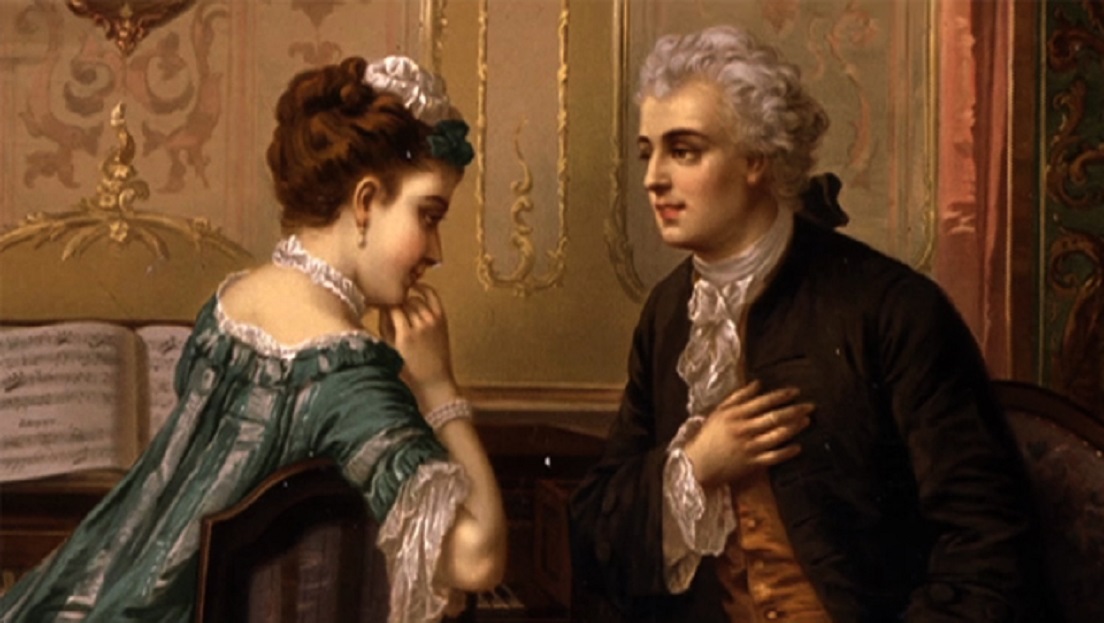 Thomas Jefferson was 28 years old and Martha, affectionately known as Patty.Thomas Jefferson married to Martha Wayles Skelton (1748- 1782), a widow of Bathurst Skelton, when she was 23. She had one son by her first marriage: John Skelton (1767-1771), but he soon died in an accident. After the marriage, Jefferson brought Martha to live with him in his home in Charlottesville, Virginia, today is known as Monticello.Martha Wayles bore six children in her marriage with Thomas Jefferson.He promised his wife on her deathbed he would never re-marry.
Thomas Jefferson was 28 years old and Martha, affectionately known as Patty.Thomas Jefferson married to Martha Wayles Skelton (1748- 1782), a widow of Bathurst Skelton, when she was 23. She had one son by her first marriage: John Skelton (1767-1771), but he soon died in an accident. After the marriage, Jefferson brought Martha to live with him in his home in Charlottesville, Virginia, today is known as Monticello.Martha Wayles bore six children in her marriage with Thomas Jefferson.He promised his wife on her deathbed he would never re-marry.
Born on April 13, 1743, Thomas Jefferson was a leading figure in U.S country’s quest for independence. A native of Virginia, Jefferson also played important roles in the early history of fledgling nation as its Minister to France, Secretary of State and third President.A true Renaissance man, Jefferson is known for his many talents in writing, economics, religion and philosophy as well as horticulture and mathematics. He spoke 6 languages including English, French, Greek, Italian, Latin and Spanish. He also had a love for the written word, having written over 19,000 letters in his lifetime.In the year 1743, Peter and Jane Jefferson smiled down at their squirmy little newborn baby Thomas, and in that moment they knew he would grow to be someone great.At a young age, Thomas showed a love for reading and learning. He was always interested in learning new things like science, invention, architecture, religion, philosophy, and languages, five of which he learned fluently. As well as traditional schooling in the classics, he took up violin. When he was old enough, his mother sent him to William and Mary's College for boys.Thomas Jefferson excelled there. He loved everything they taught him, but especial enjoyed politics. He soon went on to law school, and planned to become a lawyer.After he had been practicing law for a while, he met a beautiful widow by the name of Martha Wales Skelton. In less than a year, she became Martha Wales Skelton Jefferson. At his father's death, Thomas inherited Monticello, his lifelong home, and 22 slaves. When Martha's father died, they inherited 11,000 acres and 135 slaves as well as a lot of debt. This started a downhill slide in his financial situation.Martha was married to Thomas for ten years and gave birth to six children, only two of whom made it to adulthood. Weakened by the frequent child-bearing,ill health, and diabetes, Martha died in 1782. Thomas Jefferson was distraught and nearly drove himself to exhaustion from grief. He promised her he would never marry again. Throughout his life, Jefferson had twelve grandchildren, several of them having lived with him at Monticello. Jefferson loved to play with his grandchildren, teaching them how to play chess and a game called Goose. Goose was one of the first board games in the United States, rather similar to our modern version of Chutes and Ladders.After his wife died, historians believe he began a relationship with Sally Hemings, one of his slaves. After his death, Jefferson’s daughter allowed Hemings to live as a free woman in Charlottesville until she died in 1835. DNA tests in 2000 show a familial gene common between their descendants.Jefferson was an inventor, lawyer and educator. He graduated from the University of William and Mary at the age of 18, two years after he enrolled in 1762. He was the designer of Monticello, the Virginia State Capital and The Rotunda at the University of Virginia among other notable buildings. His influential style has become known as “Jeffersonian Architecture”. Monticello and The Rotunda are both World Heritage Sites.At the age of 33, Jefferson was one of the youngest delegates to the Second Continental Congress in Philadelphia. He became acquainted with John Adams, a leader of the Congress, and through this budding friendship, Jefferson was appointed to the Committee of Five that was tasked with drafting the Declaration of Independence. Over the next 17 days, he would create the first draft. Jefferson is considered by many to be the primary author of the document because the committee left intact more than 75 percent of his original draft. Many believed that John Adams would be the primary author of this important document, but he had persuaded the Committee to choose Jefferson instead. The preamble is regarded as one of the most enduring statements of human rights and the phrase “all men are created equal” is considered one of the most well-known expressions in the English language. Jefferson was an eloquent writer, but did not fancy himself a public speaker, and chose to show his support of the Patriot cause through written correspondence.In his early career, Jefferson traveled in Europe and became enamored with its cuisine, especially pasta. He served macaroni and cheese to guests at Monticello and even drew plans for a macaroni machine. He has been referred to as a “Founding Foodie” and “America’s First Foodie,” and there is even a mac ‘n’ cheese recipe in his own handwriting.
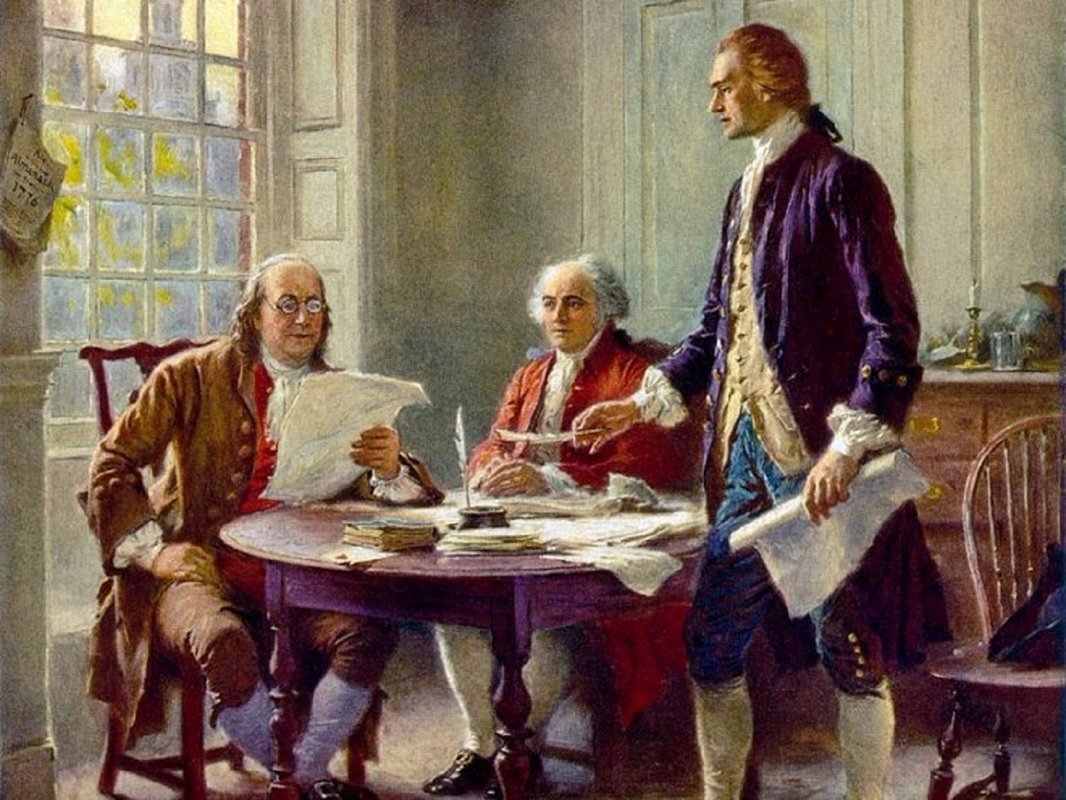 On July 2, 1776, the Second Continental Congress voted unanimously to declare independence from Great Britain. Approximately 20 percent of the members of Congress were opposed to separation, but some did not vote, so that Congress might "speak with one voice." The Declaration was necessary for concrete as well as symbolic reasons: the colonies needed foreign aid to keep fighting, but to obtain foreign aid it had to seek more than reconciliation with Britain, it had to proclaim itself a nation.
On July 2, 1776, the Second Continental Congress voted unanimously to declare independence from Great Britain. Approximately 20 percent of the members of Congress were opposed to separation, but some did not vote, so that Congress might "speak with one voice." The Declaration was necessary for concrete as well as symbolic reasons: the colonies needed foreign aid to keep fighting, but to obtain foreign aid it had to seek more than reconciliation with Britain, it had to proclaim itself a nation.
Jefferson served as the country’s first Secretary of State under President George Washington (1790–1793). In this office, he advocated for each state to pay its own portion of the Revolutionary War debt and supported France in its war with Britain, though he believed the United States should maintain neutrality in the conflictHe wrote The Virginia Statute for Religious Freedom (1777).Jefferson considered The Virginia Statute for Religious Freedom to be one of his greatest accomplishments. This document, which was introduced into the Virginia General Assembly in 1779, declared freedom of religion a “natural right” and became a model for the First Amendment of the United States Constitution.Jefferson was elected the delegate of Virginia for the Continental Congress. When the congress assembled, he wrote his protests, for he was no public speaker. He was known as the "silent member of Congress."Only a year later, talk of separation from England began.After much time of protest and anguish between Britain and the Colonies, it was time for something to be done. So Thomas Jefferson was called upon, regardless of his protests, to draft the Declaration of Independence. It was in this that he, for the first time, perfectly put to word the feelings of anguish, sorrow, suffering, anger, and other offenses the colonies had against the king who was deaf to their pleas.The Declaration of Independence had to go through many drafts and editing sessions, and during that time he spent many days and nights with Benjamin Franklin and John Adams, who helped him choose with precision the language that best gave the feeling and message he wished to portray. John Adams and Ben Franklin were the two that were most supportive of this young 33-year-old while under the great pressure of writing this monumental document.Through all the late nights they stayed up editing copies, through all the picky words and slight adjustments of sentences, through the agonies of handwritten rewrite after rewrite, a friendship was born that would never die. Benjamin became like a father to Jefferson, and John like a brother. The three of them came very close through it all, and none ever regretted those days they spent modifying this country's most important document.Shortly after, war broke out, and Jefferson was back in Congress. At the age of 33, Jefferson was one of the youngest delegates to the Second Continental Congress in Philadelphia. He became acquainted with John Adams, a leader of the Congress, and through this budding friendship, Jefferson was appointed to the Committee of Five that was tasked with drafting the Declaration of Independence. Over the next 17 days, he would create the first draft. Jefferson is considered by many to be the primary author of the document because the committee left intact more than 75 percent of his original draft. Many believed that John Adams would be the primary author of this important document, but he had persuaded the Committee to choose Jefferson instead. The preamble is regarded as one of the most enduring statements of human rights and the phrase “all men are created equal” is considered one of the most well-known expressions in the English language. Jefferson was an eloquent writer, but did not fancy himself a public speaker, and chose to show his support of the Patriot cause through written correspondence.The war brought great devastation for many; they were greatly outnumbered, but they knew there was no turning back. After they had spat in the face of their king, they could not go and just crawl back under his cruel hand. The tyranny and injustice was too much for them to bear, and each knew that they must prevail, and they must do it together.Thomas Jefferson loved his home, Virginia, so very much that he wanted to do all for it that he could. He served in the House of Burgesses, and he was elected as governor of Virginia at the tender age of 36. It was only after the chaotic election of 1800 between Jefferson and John Adams that Congress decided to ratify the 12th Amendment to the Constitution. The debacle occurred when Jefferson received the same number of electoral votes as his running mate Aaron Burr and Burr refused to concede the election. The House of Representatives decided the election after 36 ballots on February 17, 1801. They chose Jefferson as President and Burr as Vice President.After meeting at the Second Continental Congress in 1775, Thomas Jefferson and John Adams became lifelong friends. Their relationship deepened through years of letter-writing, including letters written between Abigail Adams and Jefferson. They spent years in France together as Jefferson and Adams served as trade ministers in Europe. The two remained close friends despite their political differences; that is, until Jefferson beat Adams in the Election of 1801 to become President of the United States. They resumed their close friendship after about 10 years of separation. Both Thomas Jefferson and John Adams died on July 4, 1826, the 50th anniversary of the Declaration of Independence. Legend holds that Adams’ last words were “Thomas Jefferson survives.” Unbeknownst to Adams, Jefferson had died a few hours earlier. They were the last surviving members of the original group of Patriots that became known as America’s Founding Fathers. Jefferson and Adams also share the distinction of being the only Declaration of Independence signatories who would later serve as President.
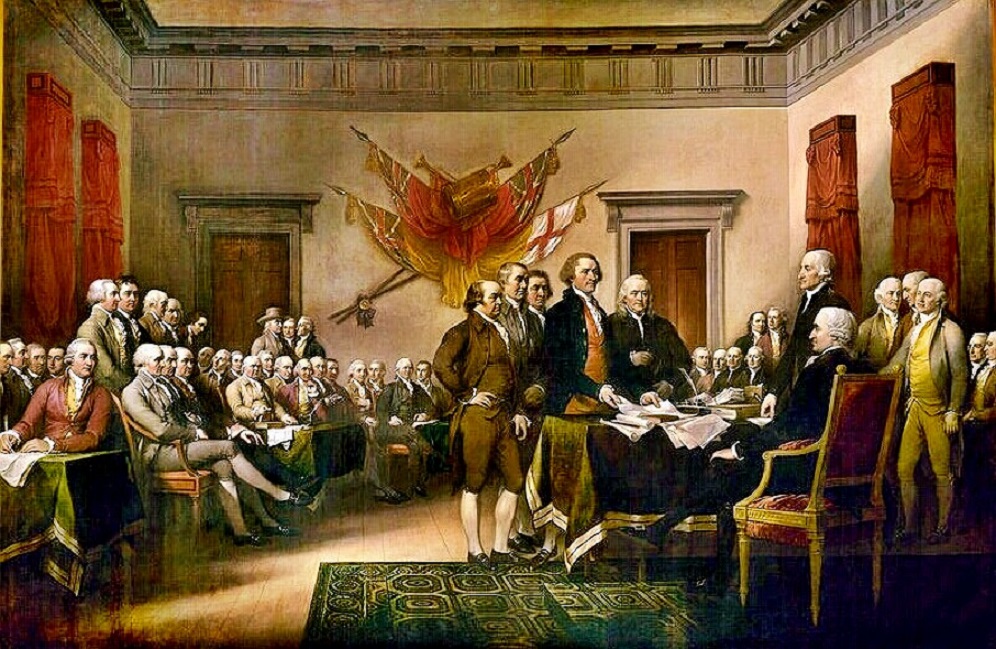 Thomas Jefferson,Roger Sherman, Benjamin Franklin, John Adams, and Robert Livingstonpresenting a draft of the Declaration of Independence to Congress.Delegates from each of the Thirteen Colonies met in
Philadelphia in the summer of 1776 to decide the case
for liberty. The goal was to convince the States that the
time had come for the United Colonies to declare their
independence from Mother England.
Thomas Jefferson,Roger Sherman, Benjamin Franklin, John Adams, and Robert Livingstonpresenting a draft of the Declaration of Independence to Congress.Delegates from each of the Thirteen Colonies met in
Philadelphia in the summer of 1776 to decide the case
for liberty. The goal was to convince the States that the
time had come for the United Colonies to declare their
independence from Mother England.
Jefferson was a man of many talents. He was the author of the Declaration of American Independence, a founding father of the United States and the country's third president.America's declaration of independence from the British Empire was the nation's founding moment. But it was not inevitable.Until the spring of 1776, most colonists believed that the British Empire provided them protection and opportunity. The mother country consumed colonists' goods, defended them from Native American Indian and European aggressors, and extended British rights to colonists. In return, colonists traded exclusively with Britain, obeyed British laws and customs, and pledged their loyalty to the British crown. For most of the eighteenth century, the relationship between Britain and her American colonies was mutually beneficial. Even as late as June 1775, Thomas Jefferson said that he would "rather be in dependence on Great Britain, properly limited, than on any nation on earth, or than on no nation. But this favorable relationship began to decline in the wake of the Seven Years' War. In this conflict with France, Britain wracked up an enormous debt and looked to its American colonies to help pay for the war. Between 1756 and 1776, Parliament issued heavy taxes, including the Stamp Act of 1765 and the Tea Act of 1773. Unsurprisingly, Parliament's taxes met with stiff colonial resistance. But instead of compromising, Parliament passed oppressive measures to force colonists to obey the new laws. Eventually, tensions culminated in the shots fired between British troops and the colonial militia at Lexington and Concord in 1775. Despite the outbreak of violence, the majority of colonists wanted to remain British. Only when King George III failed to address colonists' complaints against Parliament or entertain their appeals for compromise did colonists begin to consider independence as a last resort. In the spring of 1776, colonists still hoped for reconciliation with Britain. Those hopes were diminished, however, by the continuing war and rumors of a large-scale invasion of British troops and German mercenaries.As he sat at his desk in a Philadelphia boarding house, Jefferson drafted a "common sense" treatise without, he claimed, opening a single book or pamphlet. Some of his language and many of his ideas drew from well-known political works, such as George Mason's Declaration of Rights and the new Virginia state constitution. But his ultimate goal was to express the unity of Americans—what he called an "expression of the American mind" against the tyranny of BritainThe first formal proposal for independence was not made in the Continental Congress until June 7, 1776. It came from the Virginian Richard Henry Lee, who suggested that "all political connection is, and ought to be, dissolved."But this was not a unanimous sentiment. Many delegates wanted to defer independence or avoid it outright. Still, Congress did nominate a drafting committee the Committee of Five—to compose a declaration of independence. Thomas Jefferson, known for his eloquent writing style and reserved manner, became the principal author.Jefferson spent much of his time in the political arena pushing legislation that he hoped would end slavery in the United States. Which is why many people find it hard to reconcile their idea of Jefferson with the fact that the man was a slave owner. Over the course of his lifetime, Jefferson owned just more than 600 slaves, freeing only a few upon his death. And although he advocated abolition, he feared it as well. He believed it would be best that freed slaves be sent overseas, as a racial war was surely to erupt. But he also believed that if slavery continued in the United States, a civil war would break out dividing the nation.Jefferson was once quoted as saying to John Adams, “I cannot live without books.” And seemingly so. An avid reader, Jefferson collected books throughout his travels. At his Monticello library he amassed the largest personal book collection in the United States. After the British burned the Library of Congress during the War of 1812, Jefferson sold his collection of 6,487 books to Congress for $23,950. He began collecting books once again, which were sold in an auction in 1829 to cover some of Jefferson’s large debt.In 1803, Jefferson purchased the Louisiana territory from Napoleon for $15 million, almost doubling the size of the United States. He also authorised the Lewis and Clark Expedition (1804-1806), which explored the American west and north west.
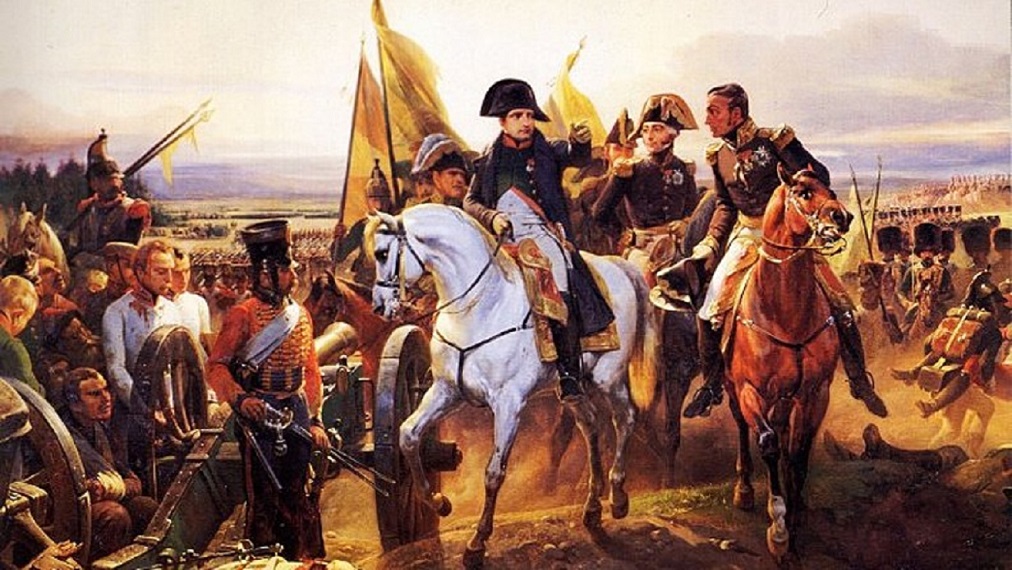 The
United States had a lot on its plate at the time and siding with France
or its archenemy, Great Britain, was not desirable. Despite the fact
that the US was in huge debt to France, for keeping the Brits at bay,
the US presidents tried to stay away from the conflict knowing that
Great Britain had a much better fleet and a lot of spirit to fight
another war in North America. Thus, for the most part, the US was
neutral. However, due to frequent impressment of American sailors into
British Royal Navy and some minor naval skirmished that resulted from
them, the US ended declaring war on Great Britain. The War of 1812
ensued, in which the White House was burned. Luckily for the new
republic, the war was almost a draw and the final defeat of Napoleon in
1814, peace was restored in America.
The
United States had a lot on its plate at the time and siding with France
or its archenemy, Great Britain, was not desirable. Despite the fact
that the US was in huge debt to France, for keeping the Brits at bay,
the US presidents tried to stay away from the conflict knowing that
Great Britain had a much better fleet and a lot of spirit to fight
another war in North America. Thus, for the most part, the US was
neutral. However, due to frequent impressment of American sailors into
British Royal Navy and some minor naval skirmished that resulted from
them, the US ended declaring war on Great Britain. The War of 1812
ensued, in which the White House was burned. Luckily for the new
republic, the war was almost a draw and the final defeat of Napoleon in
1814, peace was restored in America.
